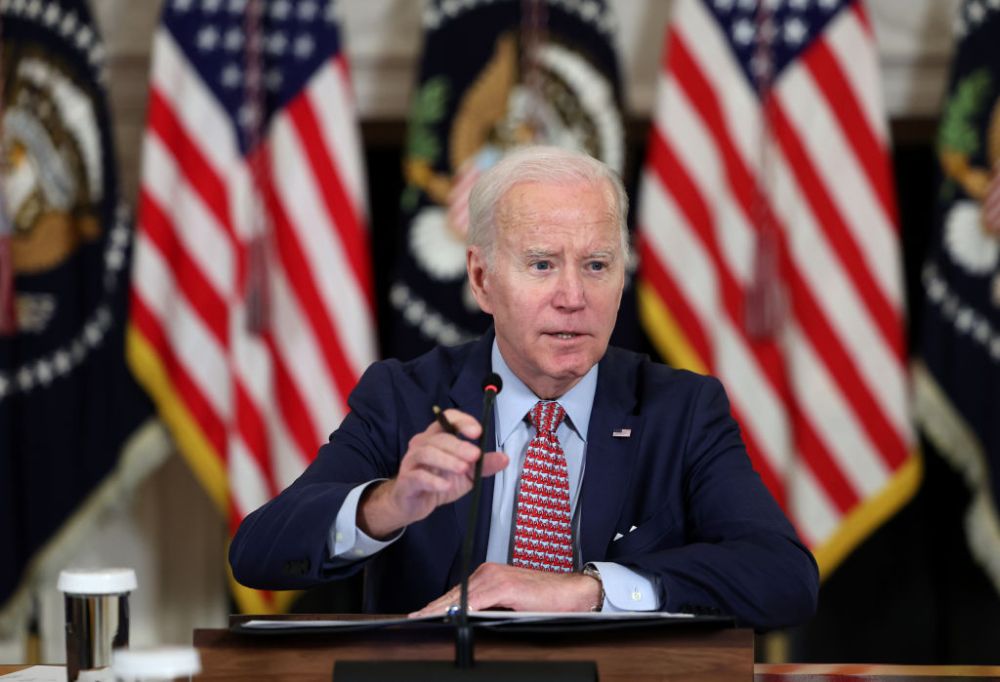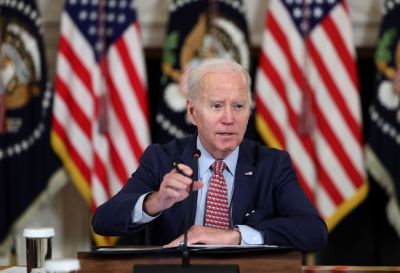Appetizer
Biden is running for reelection. Duh. And he’s a stronger incumbent than his poll numbers suggest. Right now, he’s got a 10-point deficit—43 percent approve of the job he is doing and 53 percent don’t. That’s a tick better than he was doing on the eve of the 2022 midterms. And it’s catastrophically worse than he was doing in the few months after his inauguration, when 54 percent approved and 40 percent disapproved.
Why do I think he’s stronger than he looks? Check out those head-to-head polling numbers with Trump and DeSantis. Sure, conventional wisdom is that DeSantis is a stronger challenger than Trump. I agree with that. Yet the polls don’t entirely bear that out.
If that were obviously true, we’d expect to see two important things:
1) In polling between Biden and DeSantis, we should see lower numbers for both because DeSantis is less well known, leaving more people undecided. We do see that—barely. Take the most recent Echelon Poll. Biden 47-Trump 44 and then Biden 45-DeSantis 42. The number of undecided respondents rose by only 4 percentage points when DeSantis was introduced.
2) We’d expect the undecideds to break decisively for Biden if they were open to a DeSantis bid but not open to a Trump option. But they don’t. Back to that same Echelon poll, those 4 percent then broke evenly—2 for Biden and 2 for Trump. And that’s why both DeSantis and Trump both end up 3 points behind Biden in the poll.
If Biden is holding his own, not just against Trump, but against DeSantis, it tells me that even the wobbliest part of his base isn’t willing to vote for a Republican at this point. The real problem for Biden is the same as every incumbent president: This isn’t a national race, it's 50 (or more accurately eight) state races. And no matter what the polls say, there are still undecideds in those states and they tend to break late and break in one direction.
But it also means the conventional wisdom that DeSantis is stronger than Trump in a general election might need a revisit.
Main Course
I’m going to end up ranting about three members of Congress encouraging the Biden administration to ignore federal district court rulings they don’t like. But first, we need to backtrack.
When Senate Majority Leader Harry Reid got rid of the judicial filibuster for lower court nominees in 2013, the assumption was that this would simply make it easier for a president to fill the federal courts when his party also controlled the Senate. Democrats had used the filibuster disproportionately to block Bush’s nominees that were either people of color or female (Miguel Estrada, Priscilla Owen, Janice Rogers Brown). The idea was that these would all be people on the short list for the Supreme Court if an opening were to arise and they would be popular nominees who would be difficult to attack as racist or sexist for obvious reasons. When Obama came to power, Republicans returned the favor by blocking as many of his nominees as they could.
The tit-for-tat was unsustainable, but even so there were plenty of people at the time who thought Reid’s move would have longer-term consequences that were more likely to hurt Democrats than Republicans. And it didn’t take long for those chickens to come home to poop all over the house. Just four years later, Trump was president and nominated Neil Gorsuch to fill the late Justice Scalia’s seat. Since Republicans in the Senate had blocked Obama’s nominee Merrick Garland from even getting a hearing, Democrats agreed to filibuster the Gorsuch nomination. I’m sure Republican Majority Leader Mitch McConnell thought about it for all of seven seconds before expanding Reid’s filibuster rule to Supreme Court nominees.
And that proved catastrophic for Democrats. Gorsuch was at least tied for the least controversial nominee of the last 30 years right next to Elena Kagan and John Roberts. But next came Brett Kavanaugh. There is no question in my mind that in the pre-2013 era, Kavanaugh’s nomination would have been withdrawn; I just do not believe that Republicans would have blown up the judicial filibuster at that point given the controversy. Next up, Justice Ruth Bader Ginsburg dies on the eve of the presidential election. Democrats would have had a strong case to make that you get either the Scalia seat or the Ginsburg seat—but you don’t get both. Without the filibuster, however, the moral argument didn’t have any heft behind it.
(And before the comments start rolling in, believe me, I understand the difference: In both cases the Senate was controlled by Republicans, and the Constitution requires their advice and consent. Democrats may not have liked the norm, but nothing about how the Scalia or Ginsburg seats were filled was unconstitutional. My point is on the moral grounds.)
And that’s just the Supreme Court. In total, Trump was able to get 234 judges confirmed. What matters wasn’t the sheer number—Reid surely knew that each president would now confirm judges at a much faster pace—but the types of judges that were getting confirmed.
We are 10 years into this non-filibuster experiment for lower court judges and so far Obama, Trump, and Biden have all had control of the Senate for their terms. The results have been very bad for the reputation and treatment of the judiciary. For starters, it has changed how people act who want to become judges, but also how they act once they are. Before his SCOTUS nomination, John Roberts notoriously wrote very little, said even less, and decided cases on the narrowest basis possible. After all, he knew that any promotion would require support from some not insignificant number of senators from the other party.
The line from Republicans that you’d hear most often is to nominate “the most conservative person you can get confirmed.” But that’s all changed now. Potential judges aren’t worried about support from the middle or the other side. They’re worried about getting flanked from the outside. Rather than judicial restraint, the incentives are exactly reversed—be sure to throw in some lines about how you’d decide this case if there were some more hot button issues involved or throw in a footnote about some law professor you don’t like from the other team.
Signaling is now its own virtue.
Why is this bad for the judiciary itself? As the process for confirmation became more partisan, lower court judges sound more partisan. (Note: I don’t actually think this behavior has changed the outcome of many cases; my argument is that it has changed the tone.) The public then, understandably, sees them as more partisan.
Last week, two judges issued dueling injunctions related to the abortifacient drug mifepristone. One would nullify the FDA’s 2000 approval of the drug; the other would require the FDA to maintain the status quo. Three members of Congress (two Democrats and one Republican) said the Biden administration should ignore the ruling they didn’t like. Not appeal it. Just … ignore it.
This is stupid for no fewer than 17 reasons. First and foremost, this was a district judge with two more layers of appeals above him. District judges issue incorrect rulings every single day. Literally! Next up, why in the world would either “side” want to let the president decide which rulings to follow? What is the point of a judiciary if the president can just decide for himself whether his own actions are legal? (Because, remember, the FDA is part of the executive branch … so in this case, it would be the president ignoring a ruling that held his own branch’s actions illegal.) We can go ahead and end the student loan debt cancellation lawsuit now because I already know that the Biden administration thinks it's legal. I could go on.
I don’t think any of this would be happening if the judicial filibuster were in place. The president may well have picked different people, the opinions would be written differently, and most importantly, it would be much harder for partisans to attack outcomes they didn’t like because 10-ish members of their own party would have voted to confirm the judge. “Sure, he was appointed by a Republican president but he received bipartisan confirmation from the Senate” would be true of every single robe out there.
I’ll grant that the causal effects of my filibuster thesis are hard to disentangle from the rise of social media, negative polarization, and a post-Trump “he undermined these norms and the rule of law first” vibe, which have all happened in the last 10 years as well. And perhaps the death of the judicial filibuster was inevitable if you lived through the confirmation wars of the early aughts. If it were still in place, maybe all law would have ground to a standstill because no judges would be confirmed from either party anymore. But still. I’m watching lawyers, law students, and judges behave much differently than they would have in 2012, and like Carrie Bradshaw, I can’t help but wonder: Did we bring this on ourselves?
Dessert
It's important to recognize when your political adversaries are right and the screaming mob is wrong.







Please note that we at The Dispatch hold ourselves, our work, and our commenters to a higher standard than other places on the internet. We welcome comments that foster genuine debate or discussion—including comments critical of us or our work—but responses that include ad hominem attacks on fellow Dispatch members or are intended to stoke fear and anger may be moderated.
With your membership, you only have the ability to comment on The Morning Dispatch articles. Consider upgrading to join the conversation everywhere.